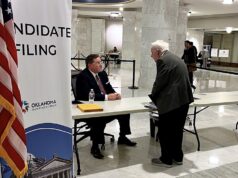WASHINGTON — Party-line votes were the norm this week in the U.S. House of Representatives. Whether it was a resolution censuring the chairman of the House Intelligence Committee or an election security act, members of Oklahoma’s delegation voted with their party.
On Monday, House members voted 218-185 along party lines to table the censure resolution of House Intelligence Committee Chairman Adam Schiff (D-CA28) for inaccurately quoting a July phone call between President Donald Trump and the Ukranian President Volodymyr Zelensky. Twenty-eight House members did not vote.
This story was reported by Gaylord News, a Washington reporting project of the Gaylord College of Journalism and Mass Communication at the University of Oklahoma.
Republican representatives from Oklahoma, Rep. Kevin Hern (R-OK1), Rep. Markwayne Mullin (R-OK2), Rep. Tom Cole (R-OK4) and Rep. Frank Lucas (R-OK3), voted with their party against tabling the resolution to censure Schiff, while Rep. Kendra Horn (D-OK5) voted in favor of killing the resolution.
Schiff faced backlash after misquoting the now-infamous phone call between Trump and Zelensky, which sparked a whistleblower complaint and paved the start to a formal presidential impeachment inquiry, during a House Intelligence Committee hearing in late September.
However, since the impeachment inquiry began, Democrats in the House have faced scrutiny on their handling of the formal inquiry.
“They are relying on a biased process, full of secret meetings and one-sided statements,” said Sen. Jim Inhofe (R-OK) of House Democrats in a statement on Thursday. “The double standard shows that this isn’t about anything President Trump did or didn’t do—this is about trying yet again to overturn the results of the 2016 election.”
Amid the impeachment controversy, House Republican leaders held a press conference on Wednesday morning to further condemn Democrats, claiming the inquiry is a partisan effort to remove a duly elected president.
Republican leaders have argued that House members should be required to vote on formally launching the impeachment investigation. This would put Democrats, like Horn, who may be vulnerable during the 2020 elections on the record of either supporting or opposing impeachment.
“In the past, what the House did was vote to impeach—or to consider impeachment—and set up a process where the president and the minority would have their rights protected in the inquiry,” said Cole in a video published to his Youtube channel on Thursday.
Mullin and Hern, who do not sit on committees involved in the impeachment hearings, attempted to enter a closed meeting on Wednesday to view impeachment documents, causing Schiff to delay impeachment inquiry testimonies for several hours.
“Oklahomans are being completely shut out of this process—not one of the five representatives in our delegation are on any of the committees participating in the impeachment inquiry. Since this inquiry is happening behind closed doors, there are no Oklahomans with access to important documents, testimonies and hearings,” said Hern in a statement.
While no Oklahomans have been involved in the impeachment hearing, representatives from both the Democratic Party and Republican Party have been involved in hearings regarding the impeachment inquiry.
“Together we stand and fight for Oklahoma,” said Mullin outside the door of the impeachment inquiry hearing after being denied access.
The House passes SHIELD Act to increase election security
Later in the week, Oklahomans along party lines in the House voted on the SHIELD Act, a bill that was written to increase election security and protect elections from outside interference.
The bill passed 227-181 in the House on Wednesday, with all Republican members from Oklahoma voting against it. Horn, the sole House Democrat from Oklahoma, voted for the bill’s passage.
The SHIELD Act, the amended version of the Federal Election Campaign Act of 1971, clarified that legislators are obligated to report foreign election influence, as well as require the “implementation of compliance and reporting systems by federal campaigns to detect and report such acts,” according to the bill.
Prior to the bill’s passage, four election security experts testified before the House Judiciary Committee regarding security of the nation’s election infrastructure on Tuesday. The witnesses included officials from the FBI, Homeland Security Department, Justice Department and U.S. Election assistance commission.
The experts explained how their agencies protect elections, secure voting systems and coordinate with local officials.
One of the witnesses, a senior adviser for the Department of Homeland Security‘s cybersecurity unit and former chairman of the U.S. Election Assistance Commission, Matthew Masterson, said that the critical elements of securing the nation’s elections are the government, communication, coordination, training and planning.
“This is by no means a new problem,” said FBI Counterintelligence Division’s Deputy Assistant Director Nikki Floris. She continued by saying foreign influence operations have aimed to spread disinformation, forming FBI investigative interest.
Sen. James Lankford (R-OK) joined with presidential candidate Sen. Amy Klobuchar (D-MN) before the August recess to work on an election security bill, saying in September that he planned to continue these efforts.
“I think we should learn the lessons on what the Russians were trying to do in 2016 and then make sure that we push back against that,” said Lankford in the September interview.
Lankford encouraged the idea of state-to-state communication, the implementation of paper ballots in all states, as well as tests that would locate vulnerabilities in election security.
While the SHIELD Act will move to the Senate, it is unlikely that the bill will pass.






















